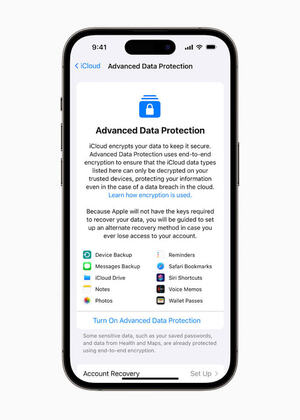Apple finally adds encryption to iCloud backups
Apple today introduced several new security features focused on fending off threats to user data in the cloud, including end-to-end encryption for backups for iCloud users.
Along with end-to-end encryption for iCloud, Apple’s cloud storage and computing platform, the company announced iMessage Contact Key Verification, allowing users to verify they are communicating only with whom they intend.
 Apple
AppleApple also announced hardware Security Keys for Apple ID, giving users the choice to require two-factor authentication to sign into their Apple ID account. (Hardware security keys use devices, such as USB thumb drives or near-field communication (NFC) dongles, to enable access to a service or application.)







